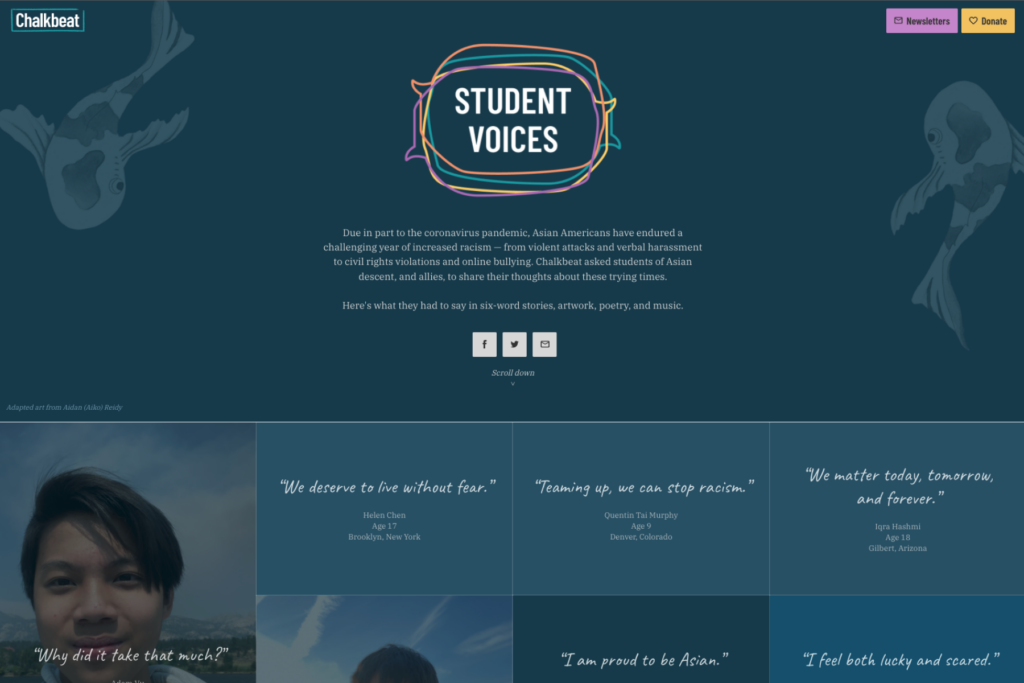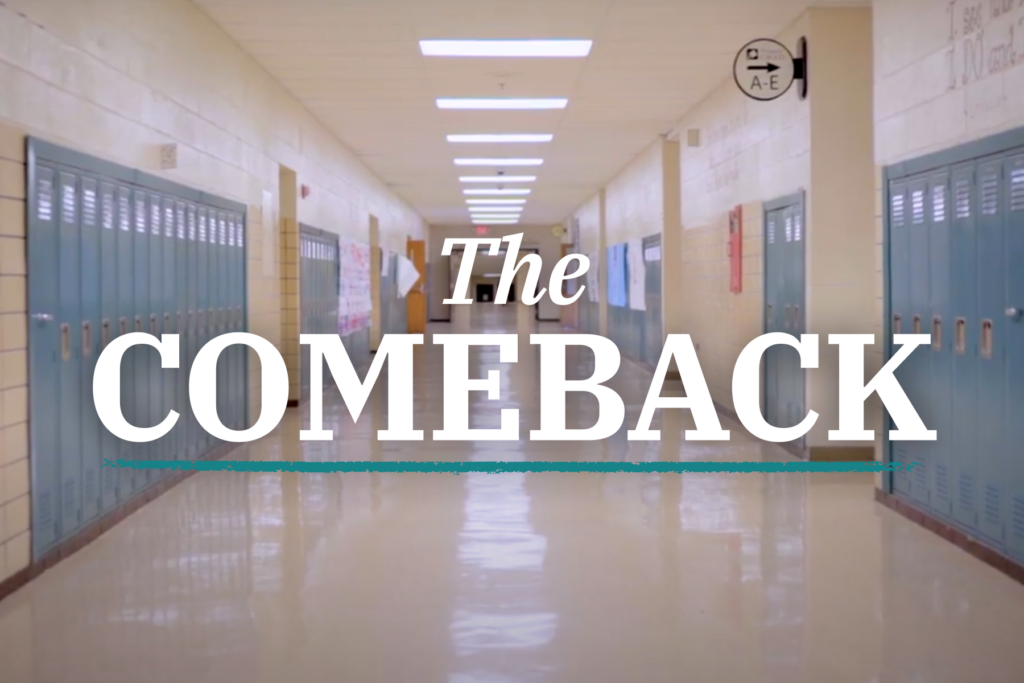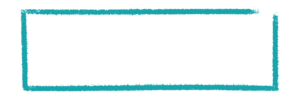
Chalkbeat
Annual Report
2021
Letter from Elizabeth Green

Dear Friends,
In 2021, as we moved into the second year of a once-in-a-lifetime global health crisis, Chalkbeat set a goal: step up and step out. We aimed to step up by meeting the rising information needs of a difficult moment, and step out by finding more ways to do that than ever before.
I believe our team has more than succeeded. Our newsroom’s theme for a year when most teachers and students were returning to school buildings after the trials of remote learning was the Comeback -- the fight to ignite passion and rebuild school communities after months of student disengagement, learning loss, shrinking enrollment, and uncertainty.
The Comeback turned out to be more challenging than we could have anticipated – from the mental health hurdles facing young people and teachers whose lives and routines were so drastically disrupted, to the widening of educational gaps for boys of color, to the rebuilding of our school communities via the influx of COVID stimulus funds, to the stop-and-start return to in-person schooling. Amid the hardships many were facing, we were able to highlight a number of bright spots, too, like the fact that an influx of federal spending has so far gone better than some feared.
We’ve been able to step up our reporting and share it more widely through valuable reporting partnerships with outlets such as the New York Times, the Washington Post, the Associated Press, and USA Today. We continue to collaborate with dozens of prominent local media partners, who republish our stories and co-host engagement events with us, such as a panel discussion on how schools in Newark and New York could best serve the mental health needs of their students at this challenging time.
In addition, we’re stepping out in a new way as well – after the success of our 2020 pilot, we continued to have an impact in 2021 with Votebeat, a new vertical covering local election administration and voting access year-round. This impact will continue into 2022 and beyond – stay tuned for more!
Thank you for your continued support for Chalkbeat! We’re looking forward to another great, impactful year.

Elizabeth Green
Chalkbeat Co-founder and CEO

Impact

Chalkbeat reporting impacted education in each of our communities.
In 2021, Chalkbeat recorded 269 real-world impacts as a result of our reporting. We track our impact using our MORI tool, for Measures of Our Reporting’s Influence.

CHICAGO
In response to the Chicago team’s inquiries last spring, the Chicago Board of Education's Office of the Inspector General opened an investigation into the practice of automatic enrollment into JROTC courses at predominantly Black and Latino high schools. Using data and interviews, we established a clear pattern: automatic enrollment in military courses occurring at smaller high schools on the city’s South and West Sides that serve a mostly low-income student body. The city’s larger North Side high schools, where more students are white, had significantly lower percentages of freshmen enrolled in the JROTC program.
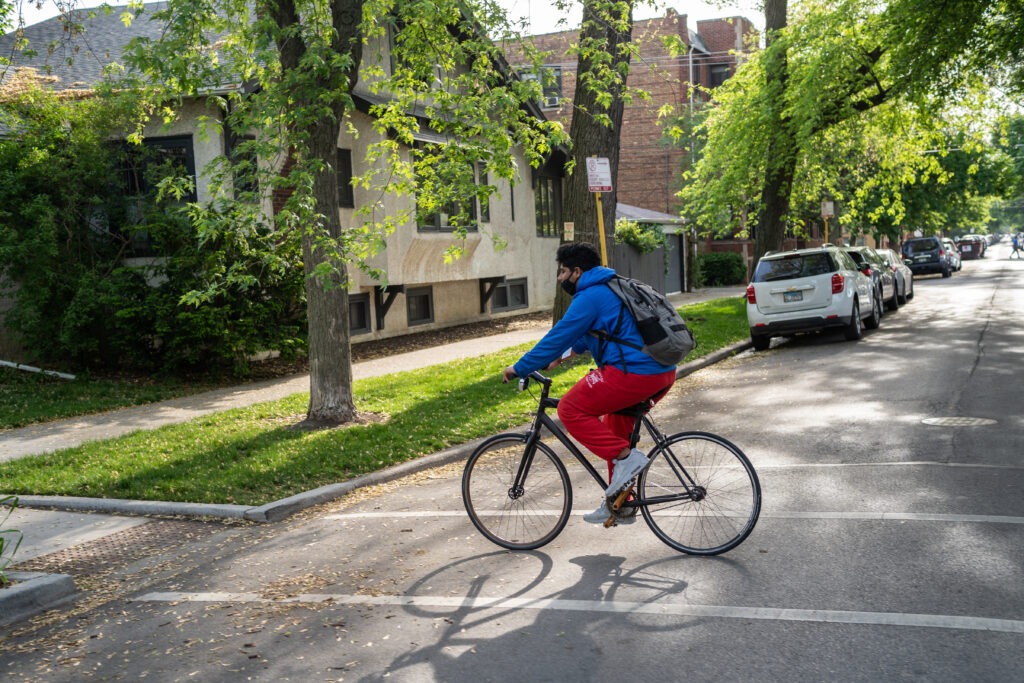
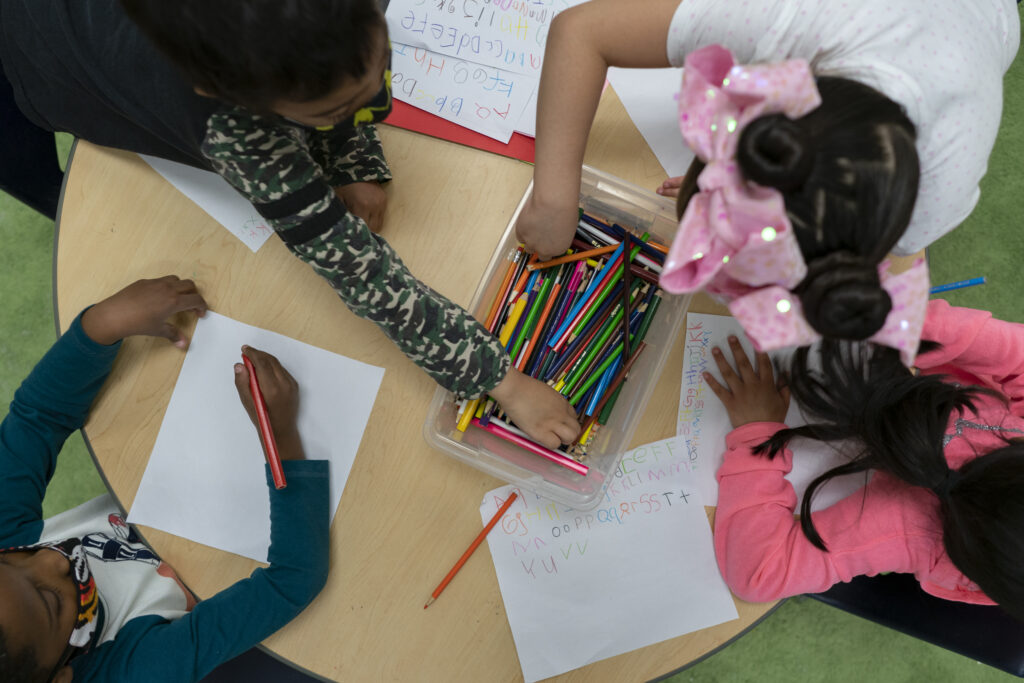
In July, reporter Mila Koumpilova’s year-long investigation into the challenges facing boys of color was co-published with USA Today, both online and in print. This project followed three students throughout the school year and highlighted how Black and Latino young men had been hit harder than other students by the disruptions to their education and their communities as a result of the pandemic.
At a September Board of Education meeting that focused on safety protocols for reopening schools, a group of parents taped together the quarantine flowchart that Chalkbeat Chicago assembled and used it to lobby the board for more remote options for students who need to quarantine or self-isolate because of exposure or travel out of state. The quarantine flowchart was also circulated among principals who told us that it was a helpful tool for school communities and at least one school shared it broadly on social media to its community.

COLORADO
When the search for a new Denver superintendent began at the start of the calendar year, a coalition of Latino leaders in Denver wrote letters to the Denver school board, op-eds in local newspapers, and held a press conference asking the board to reopen the process because they thought it was flawed. One of the leaders of the coalition said that they decided to take action after reading a Chalkbeat story reporting that the board was conducting a second round of interviews with applicants. When the coalition members realized the board was that far along in the search, they decided to take their concerns public.
In September, we wrote our first story about a 7-year-old student named Pearl, who was denied entry into Denver's online school because of her disability. The story was cited as an exhibit in a state complaint filed by Pearl's family's advocate. The Colorado Department of Education found Denver Public Schools at fault in Pearl's case and also found the district was committing violations of the Individuals with Disabilities Education Act that likely affected other students too.
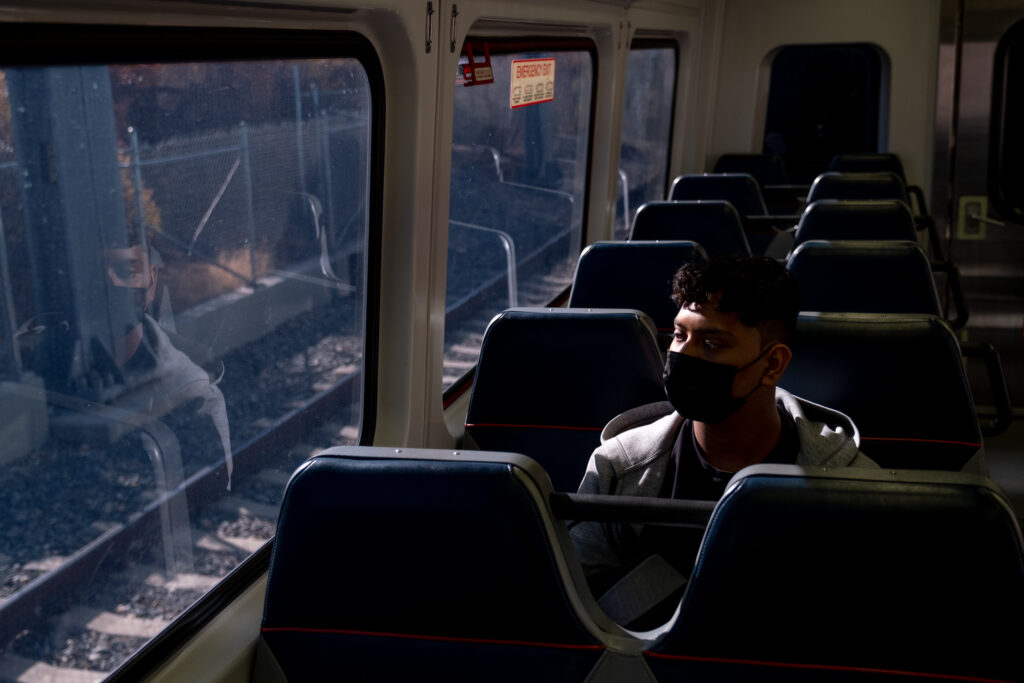
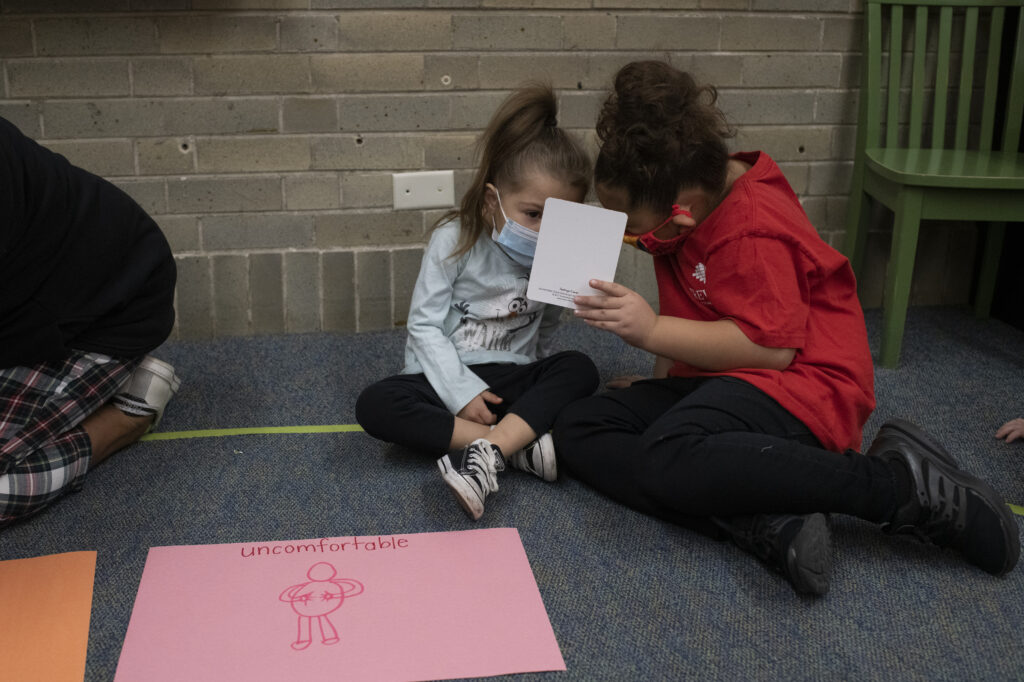
In spring 2020, we decided to make reading instruction a top coverage priority. We could see that too many kids weren’t reading at grade level, state investments had not paid off, and many school districts used discredited curriculum. Our work in 2021 provided parents with usable tools to learn more about curriculum in their district and forced one school district to acknowledge it needed to make changes. In November, we held an event in partnership with a community organization that put low-income parents in the same room with policymakers and broke news about pending curriculum changes in that district. Advocates and elected officials have repeatedly told us our coverage has changed the conversation and created urgency. “I don’t think anything in the education space in the last five years has been more important than your reading coverage,” one told us. “It has made such a difference.”
The 2020-2021 school year was our first full year of higher education coverage in Colorado. We published more than 70 stories, several of which were translated into Spanish, and launched our higher education newsletter, Beyond High School, in April. Our work has covered programs that support low income and nontraditional students to persist with higher education when barriers arise, addressed the role community colleges can play to help communities modernize their workforces as industrial jobs vanish with a changing economy, and highlighted how boosting support for worker training could help address the state’s workforce needs. Higher education officials regularly relay that Chalkbeat Colorado has filled a critical gap in coverage by reporting on state higher education and our work has been frequently picked up by outlets across the state.

DETROIT
At the start of the year, our team combed a new database that lists every teacher’s location over the last five years, which showed that teacher turnover had reached alarming rates in Michigan’s low-income communities. This analysis resulted in a story with fantastic data visualizations, as well as a searchable database. The story was part of a print package that included 6+ stories on problems in the teacher workforce, including First Person essays we solicited. It also led to TV and radio appearances, coverage in other news outlets, and captured the attention of lawmakers who brought the topic up at a budget hearing.
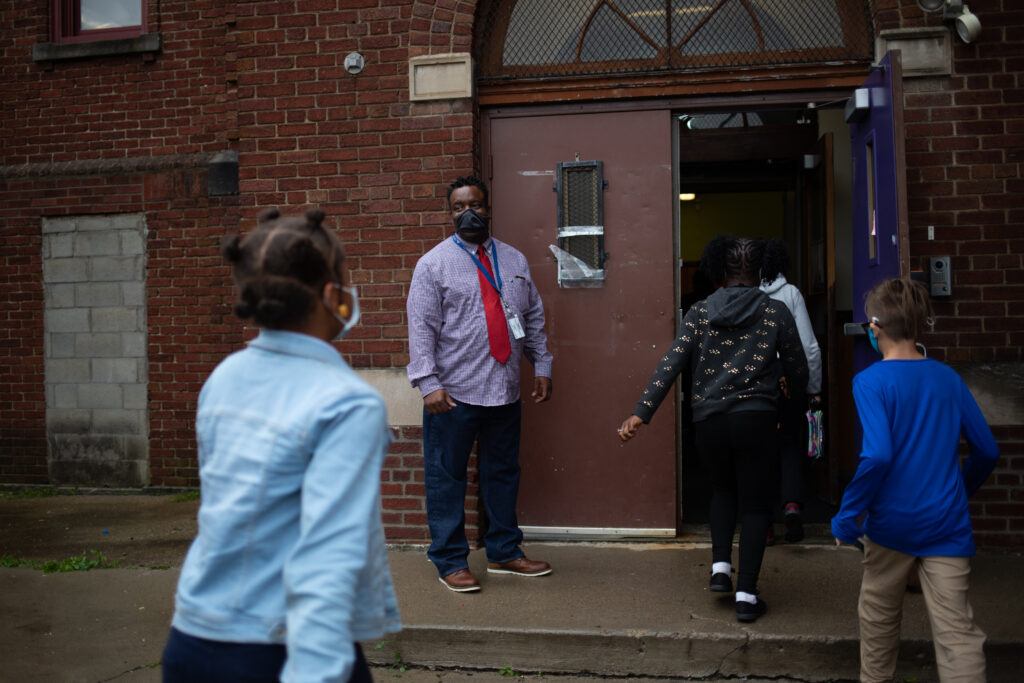
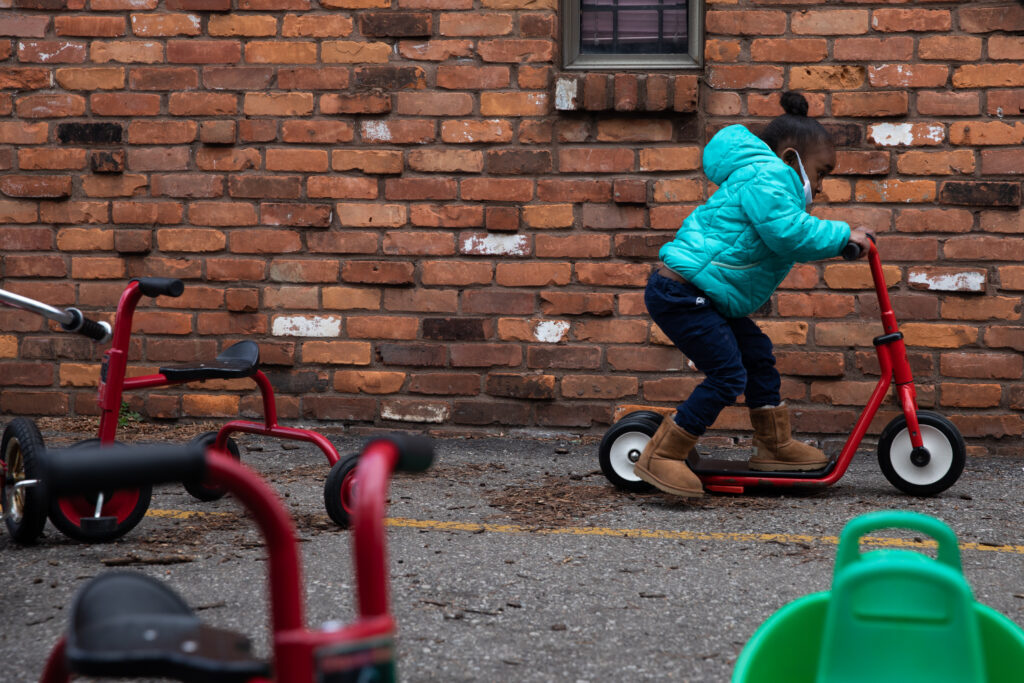
We compiled school mask data to create a searchable mask tracker at the beginning of the school year. The Michigan governor's office reached out after it was published, saying they appreciated the public exposure we were providing to this important issue. They also offered to share their own data with us to add to the tracker. A researcher at American Enterprise Institute also reached out to say our mask tracker has been useful for national research they are doing on mask mandate policies.
We also broadened our coverage this year by hiring our first state education policy reporter, Tracie Mauriello, in a partnership with Bridge Magazine. Her stories aim to explain how politicians and bureaucrats make decisions about education and extend our education reporting to include more parts of Michigan, including nine different regions of the state that are outside Detroit and its suburbs, ranging from cities like Flint and Grand Rapids to smaller areas of the state, like Benton Harbor, Traverse City and the upper peninsula.

INDIANA
Last spring, the strong instincts and diligence of our team resulted in an investigation into an aspiring charter school leader and the gaps in vetting systems that allowed him to be awarded a prestigious fellowship, despite falsified credentials and financial misdeeds. Through her reporting, Bureau Chief Stephanie Wang unraveled the school leader’s background over several weeks until a full picture emerged. This story led to impact before it was published, when he withdrew his application to start a charter school and lost his fellowship. This report also ran on the Sunday front page of the Indy Star.
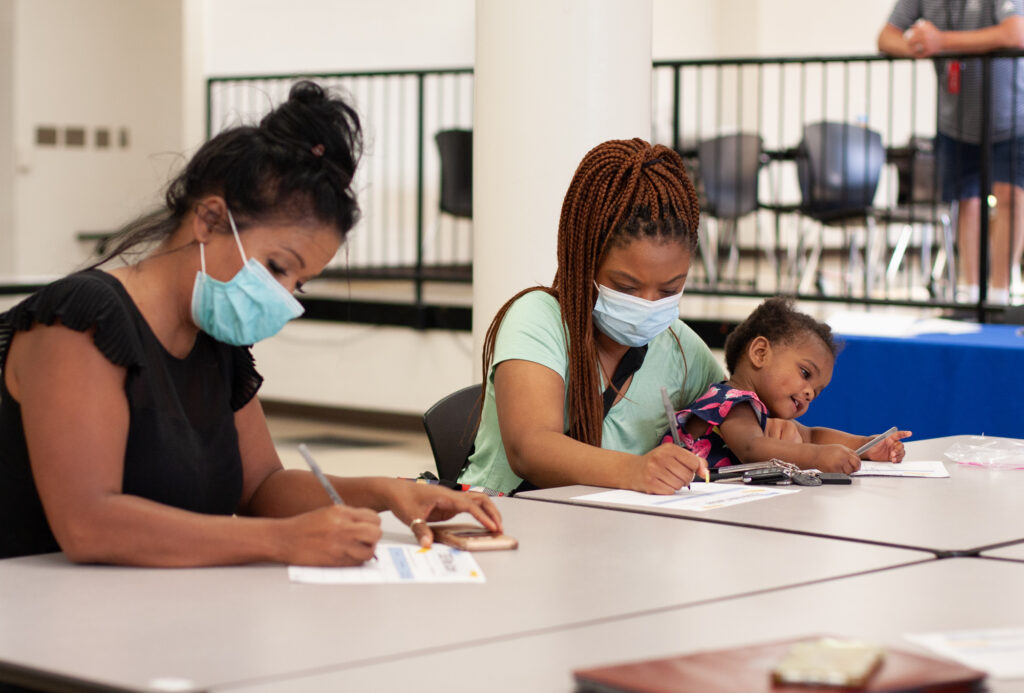
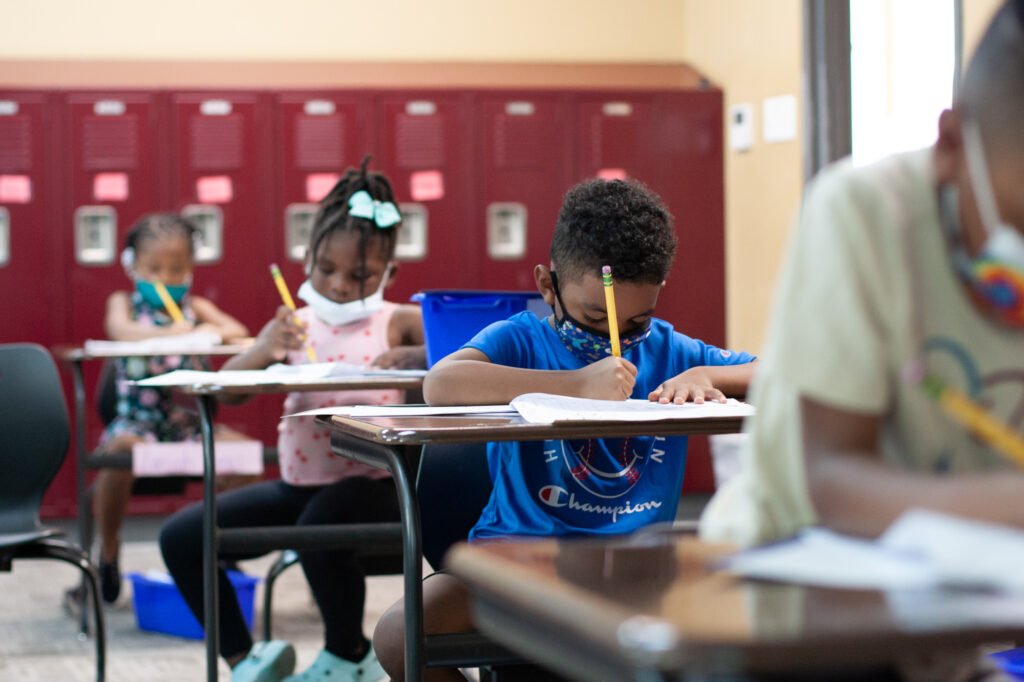
In July, Indiana’s attorney general sued two defunct virtual K-12 schools and their leaders to reclaim $154 million in state funding. Those schools and their officials have been accused of defrauding the state by inflating enrollment in a self-dealing scheme — allegations that came to light as a result of Chalkbeat Indiana’s persistent reporting over several years. The state’s investigation followed our stories, revealing the conflicts of interest as school officials contracted with a web of related companies, the dismal academic outcomes at the two virtual schools, and the lax oversight that allowed the schools to expand and avoid accountability.

NEW YORK
In March, Chalkbeat reported that New York City principals were scrambling to find ways to spend $130 million with only a few months remaining in the school year and a deadline fast approaching. Concerns surfaced about whether the money would be spent effectively to avoid having to return the funds to the district. As a result of our team raising this issue, city officials allowed schools to roll over $50 million of the original amount, giving principals an additional year to spend a portion of their refunds.
We reported that NYC officials initially declined to provide yellow bus service for summer school to a large number of students with disabilities and those in temporary housing who had received round trip bussing during the school year. We interviewed advocates that argued this was a clear violation of inclusion laws. After we reported on the issue, the city expanded the pool of students eligible for busing and promised alternatives to busing for the ride home.
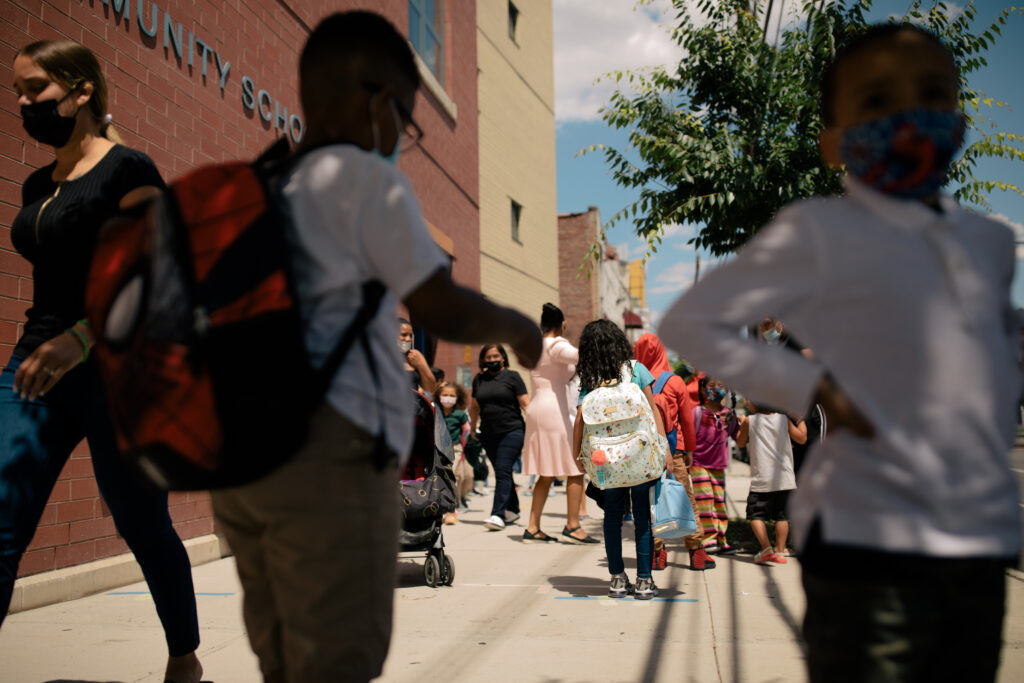
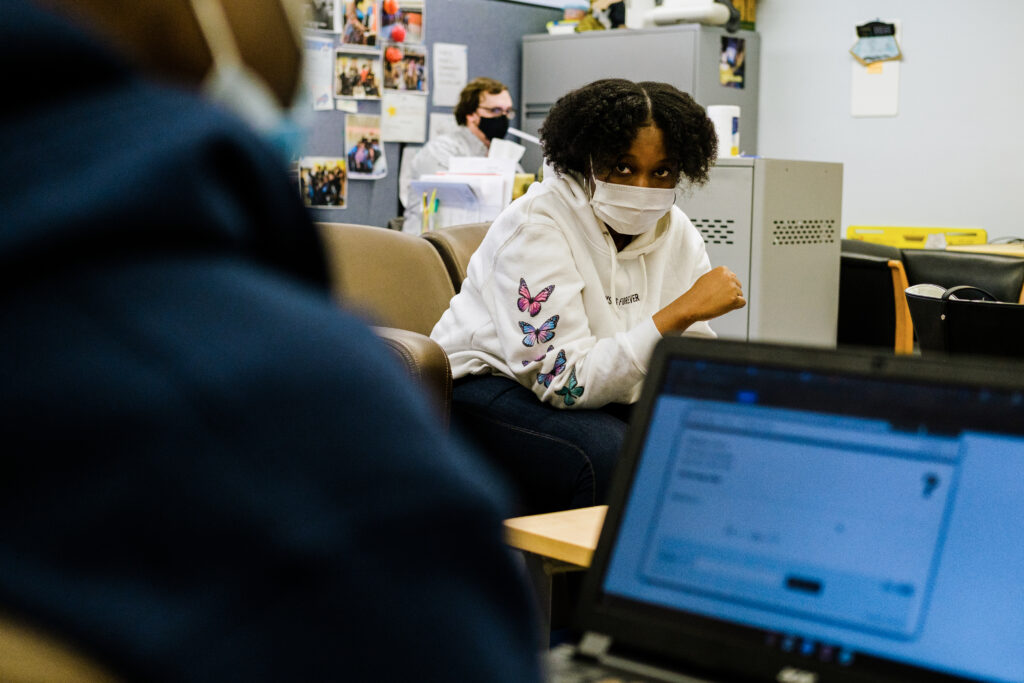
Before the start of the 21-22 school year, our team raised concerns about holes in information about ventilation upgrades in the NYC Department of Education’s public facing data portal that would likely cause confusion among families and educators as they prepared to return to in person learning. After bringing our concerns to the department’s attention, they updated its portal with a new field showing how many rooms in each school lacked any mechanical ventilation. We also pressed the education department for COVID data for charter schools in order to better understand how they dealt with coronavirus related shutdowns, since many of those schools opened before the city's district schools did. The city did not have any publicly posted data so we had to request it from the health department. After our story was published, the DOE updated its public website to include a new section with COVID case data for charter schools.

NEWARK
At the beginning of 2021, the Newark team published a story about the district requiring families to prove residency before applying to charter schools. After reading our coverage, a Newark school board member questioned the superintendent about this practice, and a source said the practice was later discontinued.
In June, we wrote about New Jersey's delay issuing pandemic food benefits to families of school-age children. State senator M. Teresa Ruiz told Chalkbeat that she hadn't known about the delay until reading our coverage and said she planned to send a formal request to the agency in charge of the benefits asking them to explain the delay and provide details as to when families would receive the benefits.
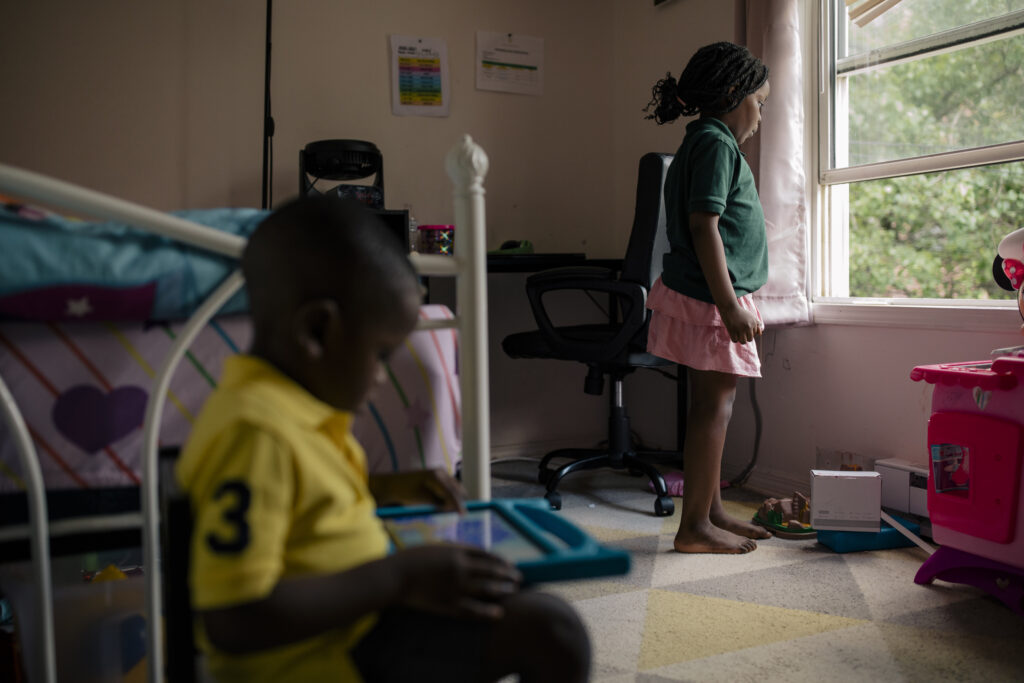
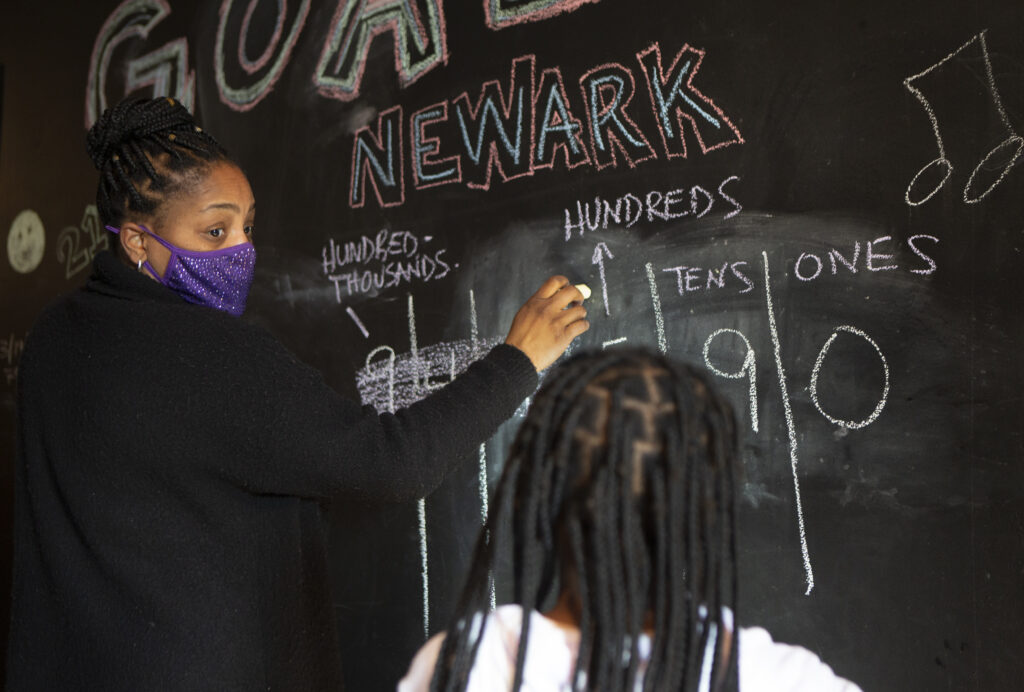
Newark Public Schools publicly posted its full ESSER I and II applications on its website after our article detailing questionable expenses. We filed records requests for the district's COVID relief plans and wrote about its unorthodox use of the money for floor polishers and vehicles. A few days later after the story ran, the district publicly posted the full list on its website.

TENNESSEE
As Chalkbeat’s only Southern bureau, Chalkbeat Tennessee has been instrumental in shepherding the network’s coverage on culture war issues unfolding in and around American classrooms. In June, the Tennessee team spearheaded the research and publication of the network’s map tracking critical race theory legislation. Leading informed debate on the issue, the bureau captured the voices of teachers and legal scholars. After reading a Chalkbeat article about how laws targeting CRT are cutting short classroom discussions about racism and sexism, an education professor at Virginia Commonwealth University said he planned to add our reporting to his law class as an example of the effects of vague legal language. In December, the bureau chief also discussed the classroom impact of the debates on Al Jazeera during a segment featuring Nikole Hannah Jones.
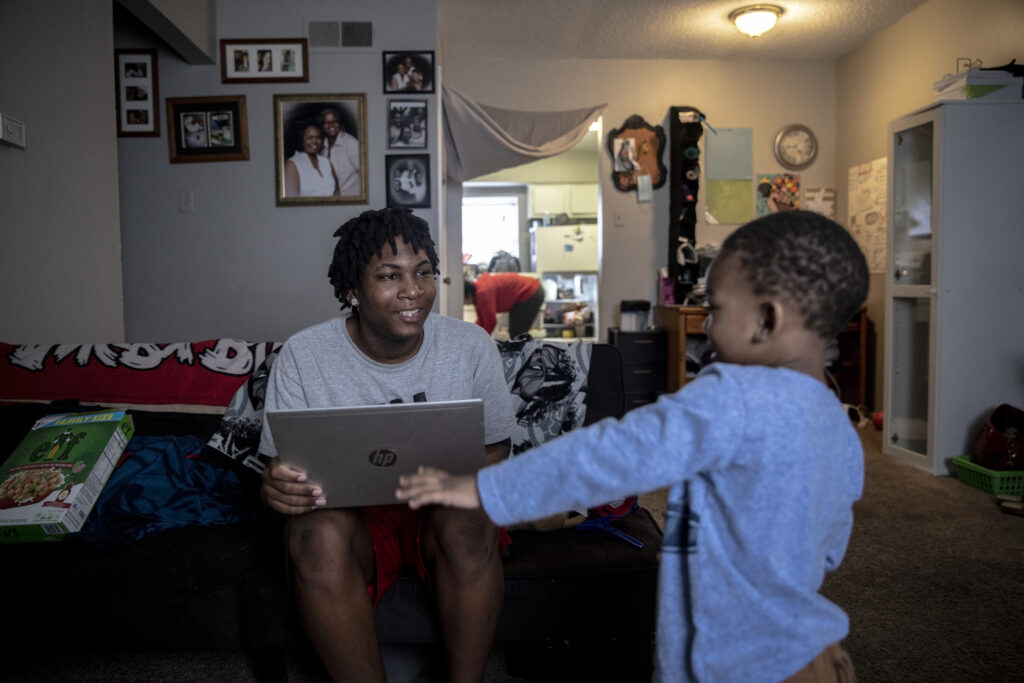
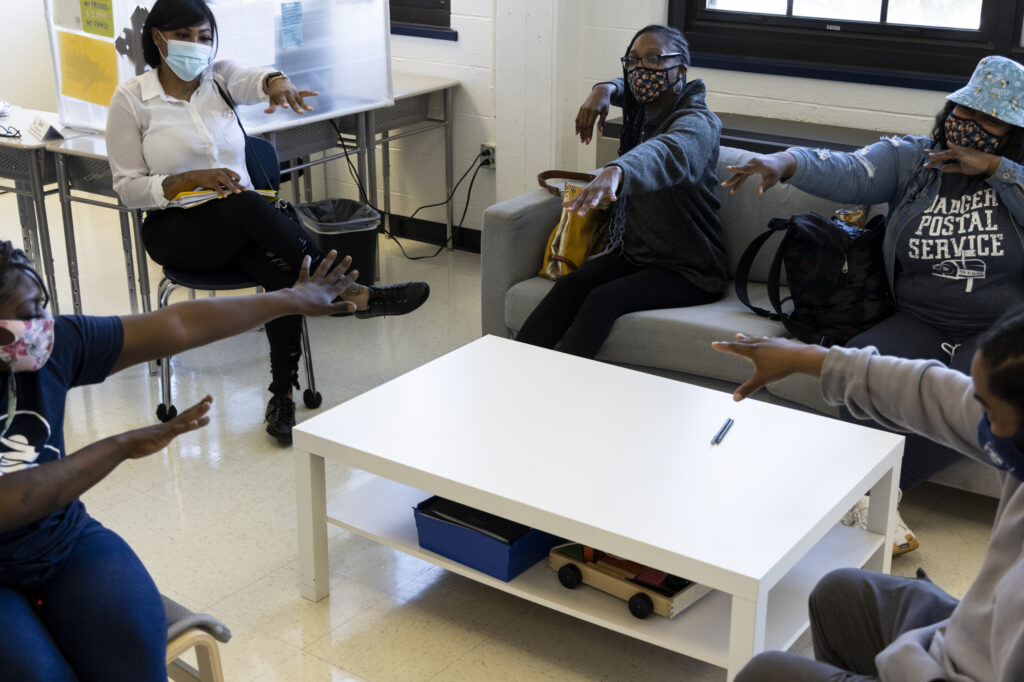
As the pandemic unfolded, Chalkbeat Tennessee identified Memphis school district policies and practices that misaligned with community needs, including an attempted move to make school board meetings less accessible. While Covid-19 cases raged, district officials attempted to end their live stream coverage of board meetings. Chalkbeat Tennessee reporters, and another local reporter, intervened to highlight that the board members' preference violated open meeting laws. Officials eventually relented and allowed the live stream to continue, allowing for the public to have access to deeper conversations among board members and district staff.
Additionally, following ongoing complaints and Chalkbeat’s coverage about poor school sanitation, the school board voted to drop one of its janitorial vendors just before the start of the 2021-22 school year in one of its most divided votes in recent history. After another robust debate and months of tense community conversations, in November, the Memphis school board voted to keep sheriff’s deputies in schools, but not before adding an amendment to address community concerns about interactions between police and students highlighted in Chalkbeat’s reporting on the issue. Not only did Chalkbeat Tennessee drive impact on the national and district level, its reporting also contributed to changes at the school level. In January, the Chalkbeat TN team wrote a story about the lack of transparency in personnel decisions, low teacher retention, and unexpected school closures at Memphis KIPP charter schools. These issues resulted in teachers calling on the KIPP Memphis board to fire the executive director. The board named a new executive director in September.

PHILADELPHIA
The Philadelphia team’s reporting on COVID-19 cases in schools after the return to in-person schooling encouraged the district to launch a dashboard to monitor cases. The dashboard includes information on the number of tests performed and positive cases in schools, as well as cases confirmed off site that have been reported to the district. It lists all schools in the city, including campuses that have not opened. The Caucus of Working Educators and Parents United for Public Education consider this dashboard a win and both groups credited Chalkbeat’s coverage as an impetus for its creation.
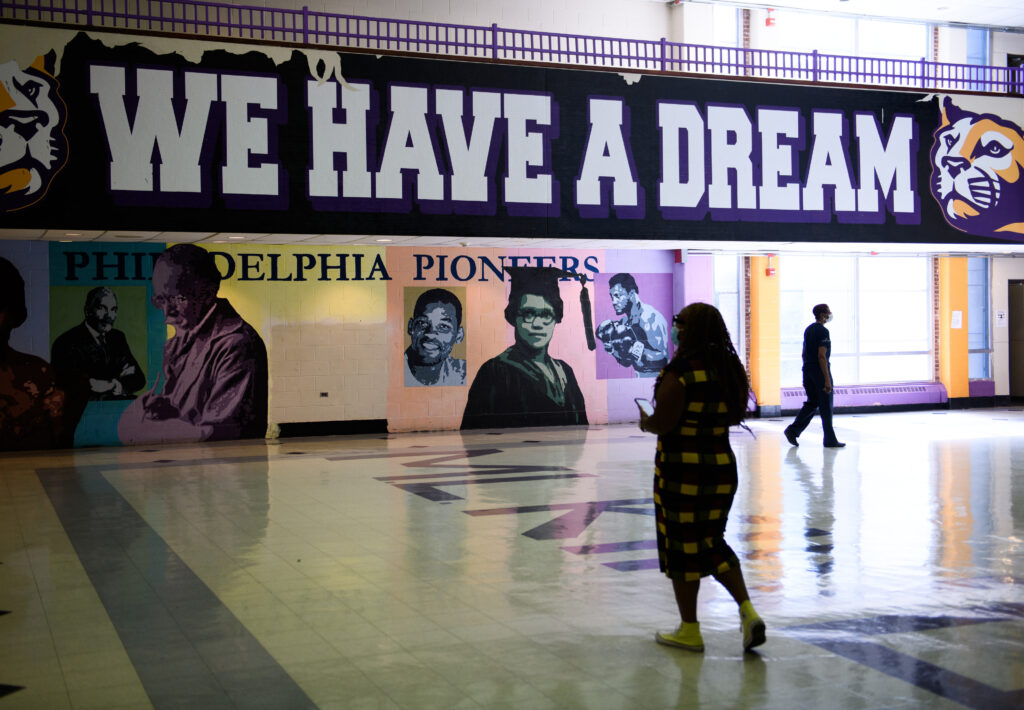
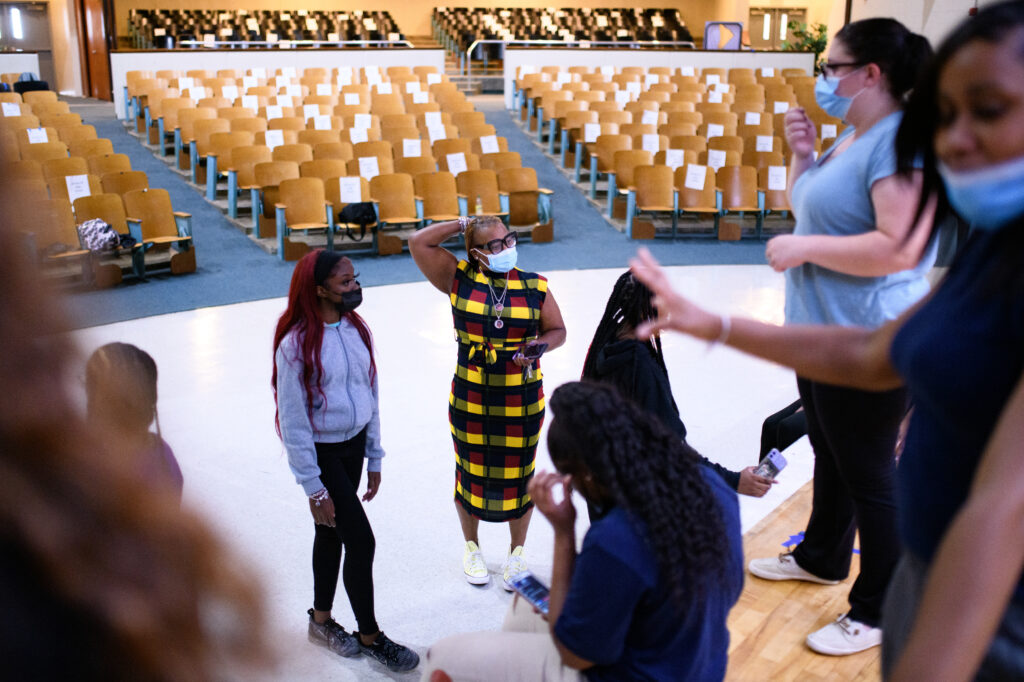
The team has remained the only media outlet in Philadelphia with an extensive focus on early childhood education. Last year, we created an early childhood education guide which covered topics such as the efforts to limit suspensions among early learners, the potential for universal preschool in the city, staffing shortages as a result of the pandemic, the importance for parental involvement in early learning, and introducing students to school for the first time.

NATIONAL
Throughout the pandemic, members of Chalkbeat’s national team consistently proved to be experts on the impact COVID had on our education system and helped Chalkbeat become the go-to source for many teachers, parents, and organizations. Reporter Kalyn Belsha appeared on MSNBC's "Way Too Early Show" in January to discuss school reopening and the effects of the pandemic on school enrollment. She also discussed reopening and efforts to vaccinate teachers on WNYC's The Takeaway. In February, reporter Matt Barnum appeared on NPR's On Point to discuss CDC school reopening guidance. His April coverage on teacher turnover rates was cited in at least four reports, including papers from RAND, University of Arkansas, University of Michigan, and Vanderbilt.
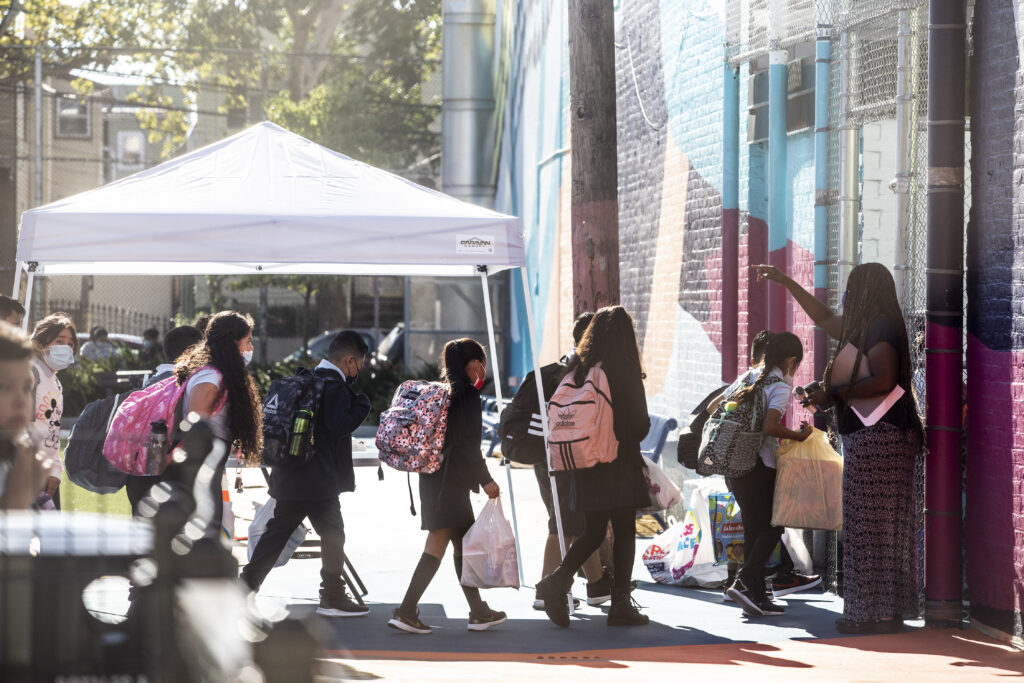
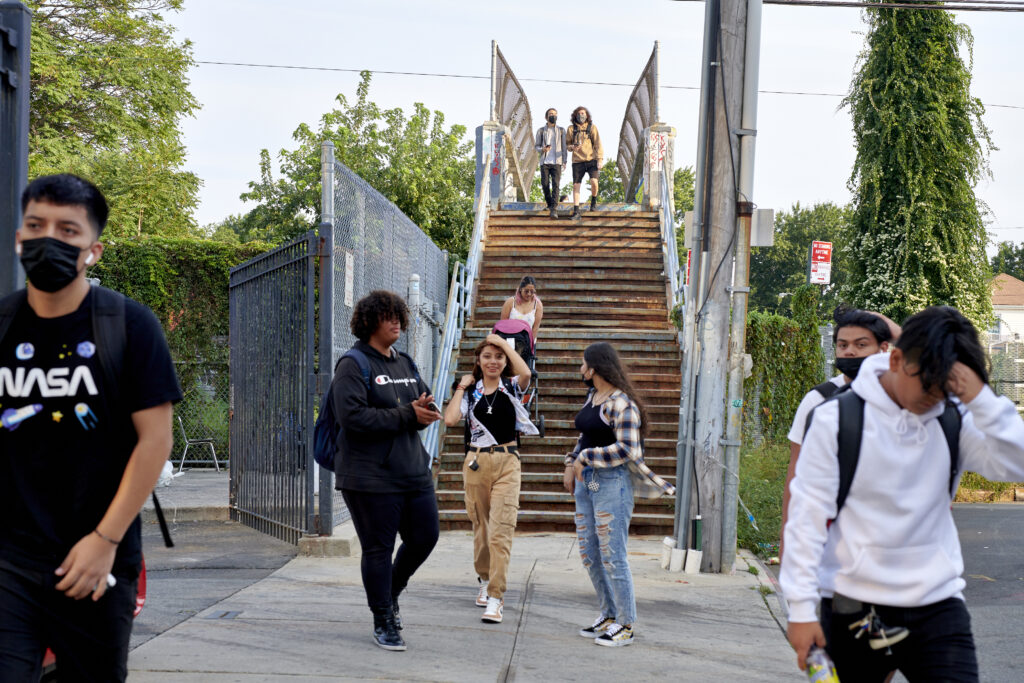
The team was not only the authority on the pandemic, but on a variety of other topics as well. Chalkbeat reporting on voucher research was cited prominently in a report released by the National Education Policy Center about education savings accounts. Barnum was interviewed by Paul Tough and Ira Glass for a This American Life episode about the research around removing test scores in college admissions. The team’s reporting on school ratings continued to prompt changes and inspire published research.
Year in Review


JANUARY
The events of January 6th spurred a cross-bureau collaboration on how educators were teaching about insurrection and Capitol riot, which included a strong collection of First Person pieces from teachers and activists who shared how they grappled with the event and used it as a teaching tool.
Our newsroom also came together in the days leading up to the inauguration, turning to educators for a nationwide look at how they planned to discuss the event in their classrooms. We also featured girls of color responding to Vice President Kamala Harris’ ascension.


FEBRUARY

As part of Chalkbeat’s continued commitment to DEIB, our team celebrated Black History month with a presentation and Q&A with Sherif El-Mekki, CEO for The Center for Black Educator Development.
We also received an innovation grant from the Reynolds Journalism Institute at the University of Missouri to build a system to track source diversity. We heard from 58 journalists involved in source tracking and conducted in depth interviews. When the first phase of the project was completed several months later, we published a story of our findings.

MARCH
March marked two notable newsroom additions – Nicole Avery Nichols as editor-in-chief and Cathryn Stout as Tennessee bureau chief. Prior to joining Chalkbeat, Nicole served as the Senior News Director at the Detroit Free Press where she had been for almost 20 years. Cathryn began her career at the Commercial Appeal as a reporter and columnist before transitioning to the classroom.
March was also the one year anniversary of the school shutdowns as a result of the coronavirus pandemic. We reflected on the difficult year and the impact on students and teachers with a series of stories from across the organization.


APRIL
In response to rising anti-Asian racism, we held a mini student “takeover” of our website, amplifying the voices of Asian-American students across the country who submitted six-word stories, art, poetry and music that shared their perspectives and experiences.
In April, Catherine Carrera joined the Chalkbeat team as our first Newark bureau chief. She previously covered K-12 public schools on Long Island for Newsday, reporting on how the pandemic disproportionately affected the education of children of color, and authored a weekly newsletter called The Classroom.

MAY
After a successful newsroom pop-up, Chalkbeat brought on Votebeat team members Chad Lorenz and Jessica Huseman full time. Chad had been leading the Votebeat pop-up team since September 2021, and joined as editor in chief of Votebeat. Jessica joined Votebeat from ProPublica’s Electionland, where she served as lead elections reporter.


JUNE

We partnered with The Education Trust to present a panel of students in Michigan, New York, and Tennessee who had a conversation with U.S. Secretary of Education Miguel Cardona. In this free virtual event, the students shared their experiences of learning during the pandemic and asked the secretary questions about the policy changes they hoped to see in their communities. View the recording here.

JULY
We published our Statement on Diversity, Equity, Inclusion and Belonging as part of our continued commitment to being an antiracist organization. This document details the work we have done thus far in both our journalism and internal culture, such as auditing our sources, updating our internal style guide, and training for our staff. It also lays out a plan for our future work, including our efforts to strengthen our journalism, create an inclusive culture, and increase visibility and awareness of our DEIB work.
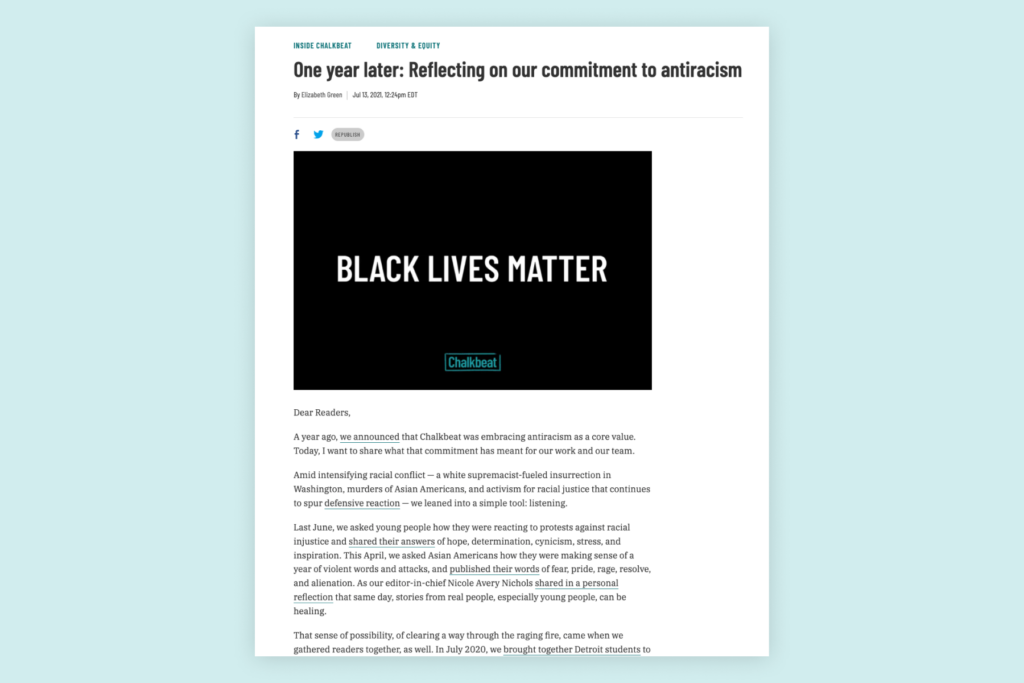

AUGUST
After months of chasing breaking news as a result of the pandemic, our newsroom created a master narrative for the 2021-22 school year to solidify our priorities across the network and elevate the impact of our journalism. This narrative, which we called The Comeback, covers the fight to rebuild our school communities after two disruptive school years marked by student disengagement, learning loss, shrinking enrollment and uncertainty. We pledged to focus on the most vulnerable students — those who receive special education services, those who have experienced insecurity with housing, students who have had to cope with mental illness, English language learners and students from underserved communities across the nation. You can read all related stories here.

SEPTEMBER
We hired our first-ever Director of Audience, Eba Hamid-Rivera. Their role is responsible for creating an audience strategy across platforms; defining our audience across verticals; developing both virtual and in-person engagement efforts; and setting goals and communicating insights.
We also hired Thomas Wilburn, Chalkbeat’s first Senior Data Editor. This role reinvented our data team and initiated an aggressive expansion of our data reporting capacity, allowing us to tackle the big education stories. The data Thomas and his team is deployed to cover will fuel powerful local storytelling as well as identify key national lessons and themes.


OCTOBER
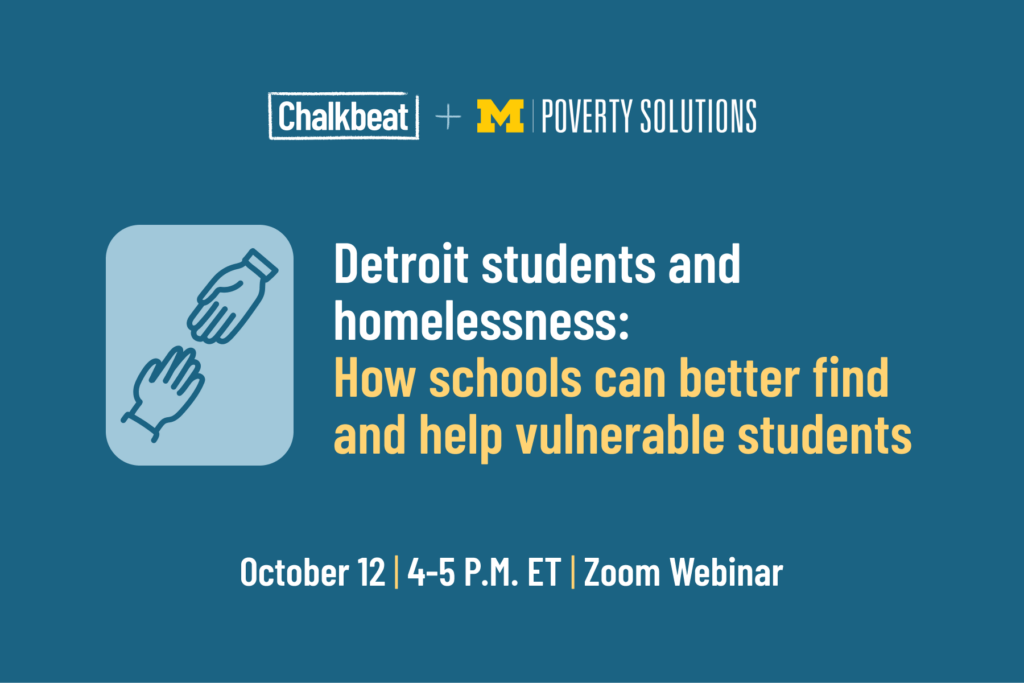
The Detroit bureau hosted a virtual event with the University of Michigan Poverty Solutions about homelessness among the city’s students. The event, which was attended by about 60 people, provided a platform for students and experts to discuss the programs that have effectively served students experiencing homelessness, what more could be done, and what parents and students affected by housing insecurity wanted districts to know.

NOVEMBER
We welcomed the first cohort of Student Voices fellows in our Chicago, Newark, and Philadelphia bureaus. The high school students worked under the guidance of our features editor to write and publish First Person essays about their educational journeys throughout the fall school semester.


DECEMBER

We raised about $73,000 during our end-of-year membership campaign. This year, all donors who gave $100+ received a Chalkbeat logo travel mug!
Chalkbeat: By The Numbers
WE'RE CONTINUING TO GROW...
$12,552,029
Our operating budget for 2020-2021, which accounts for expanded local and national coverage, as well as greater specialization at the network support level.
75
The size of Chalkbeat’s staff. This includes our award-winning reporters, story editors, bureau chiefs, as well as our product, revenue and operations teams. You can learn more about our different teams and find all of our staff bios here.
“Chalkbeat means the world to me since through it I can stay current, with the most recent news in education. I read it religiously every day before starting my day.”

WE'RE REACHING AND ENGAGING OUR CORE AUDIENCE...
980,000
The average number of monthly Chalkbeat pageviews in 2021.
70,000
The average number of readers who subscribed to our newsletters in 2021. Sign up here!
14
Number of Chalkbeat readers participating on our Reader Advisory Board. If you’re interested in joining us, you can apply here.

70.4%
Percent of survey respondents who said Chalkbeat’s email newsletters are very or extremely valuable.
35.6%
Percent of survey respondents who said Chalkbeat is the only education newsletter they read.
8.4 (out of 10)
Average survey response when asked if they would recommend Chalkbeat to a friend or colleague.
“I read Chalkbeat almost every day, and rely on it for comprehensive education news coverage. I wouldn't be as good at my job without Chalkbeat's reporting.”

WE'RE MAKING A DIFFERENCE...
2,305
Original Chalkbeat stories published in 2021.
2,485
Number of times Chalkbeat stories were republished in 2021.

30+
Number of local and national distribution partners republishing Chalkbeat’s reporting. Our partners include: Patch, Apple News, Spectrum, NewsBreak, The Associated Press, USA Today, The City, Block Club Chicago, The Commercial Appeal, The Detroit Free Press, The Indianapolis Star, NJ.com, WNYC, The Denver Post, the Tri-State Defender, the Indianapolis Business Journal, and Crain’s Detroit Business.
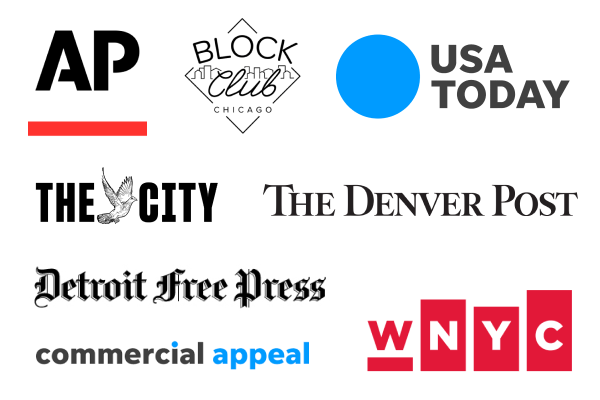
269
The number of real-world impacts — instances of informed conversations and actions — that we’ve tracked back to our reporting this year. Including:
- 86: Number of times our reporters appeared on television and/or radio to share their expertise
- 43: The number of actions — legislative changes, protests, petitions, investigations, institutional changes — that have been informed by our reporting.
- 38: The number of times a public official explicitly referred to Chalkbeat coverage.


OUR 2020-2021 FISCAL YEAR AUDIT ATTESTS TO OUR FINANCIAL HEALTH....
$10,755,527: Revenue
- 143: Total number of all individual, foundation and in-kind donations of $1,000 or more that Chalkbeat received in the last two fiscal years.
- 244: Organizations and companies who posted jobs on Chalkbeat’s jobs board in 2021.
- 77: Organizations and companies who sponsored Chalkbeat in 2021.
“I read it every time it comes in my e-mail, share some contents on Facebook that I think everyone should know about, and find out about things that I had no idea were going on. I appreciate the quality of Chalkbeat.”
$9,315,007: Expenses
- 69.5% Program services
- 21.5% Management and general
- 9% Fundraising
$7,100,711: Net Assets
Our full audited financials and 990 documents can be found here.
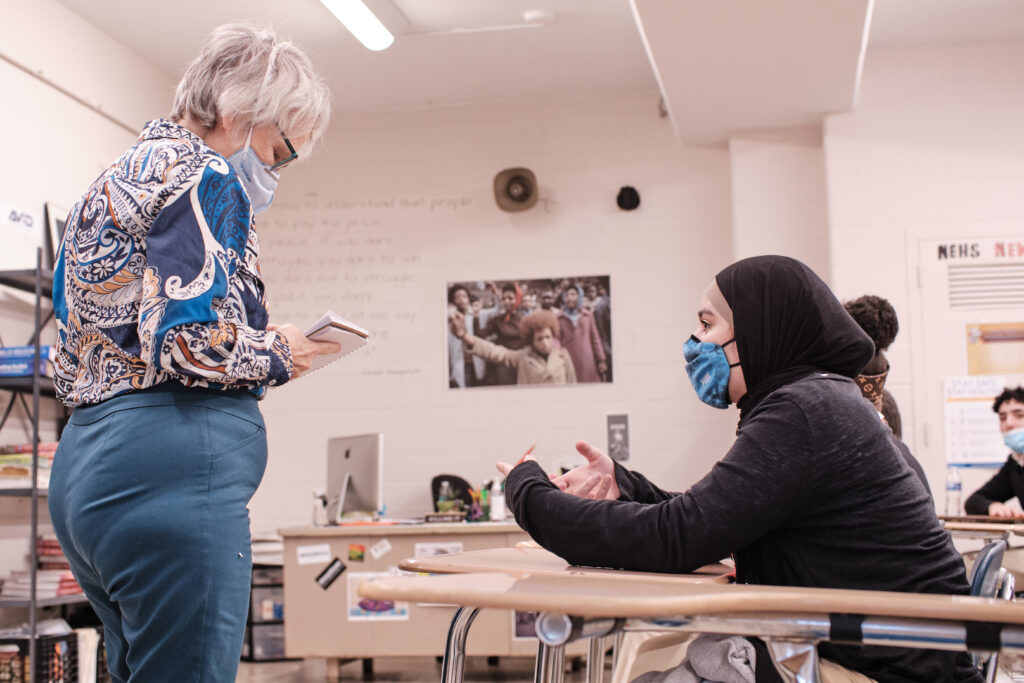
Testimonials

![]()
“Chalkbeat means the world to me since through it I can stay current, with the most recent news in education. I read it religiously every day before starting my day”
“Chalkbeat keeps *local* education topics at the forefront of discussions on how to improve our schools. Chalkbeat's journalists are asking meaningful questions, and driving truthful conversations about local education topics that actually matter to, and directly impact, families and educators.”
“I am an education researcher, and a parent. Chalbeat’s reporting is crucial to my work and to my staying informed about the public schools. The stories are all so relevant and important. Reporting like this is the best way to help ensure our next generation receives the education they deserve.”
![]()
“Chalkbeat is a reliable, comprehensive source of education news. ”
![]()
“I work in public education, and Chalkbeat is the #1 way I keep on top of the education news in my state. Their breaking news, in-depth reporting, and reporter’s live tweets from contract negotiations or board meetings are invaluable for my work.”
“Chalkbeat provides valuable information about my local education landscape that helps me especially in collaborating with nonprofit colleagues and communicating with my board.”
“I love Chalkbeat! I’m always looking for more articles about career development especially as it relates to first Gen college students and students of color.”
![]()
“I rely on you. I don’t find education reporting anywhere else that’s as well-written and informative as yours. Thank you!”
Support Us
“I donate because I support strong, independent education reporting. As traditional newsrooms have cut their reporting staffs, the education beat has taken a big hit. Chalkbeat helps make sure local education news gets the coverage it deserves."

Contact our network team:
Sponsorships, jobs board, or our calendar of events:
sponsor@chalkbeat.org
Corrections or concerns about our stories:
corrections@chalkbeat.org
Philanthropy and major donors:
grants@chalkbeat.org
Membership and online donations:
membership@chalkbeat.org
Subscription and newsletter questions:
community@chalkbeat.org
Questions about our republication policy:
mediarights@chalkbeat.org
Events and summer camp guide support:
eventslistings@chalkbeat.org
Chalkbeat employment questions:
careers@chalkbeat.org
Pitch a First Person submission:
firstperson@chalkbeat.org
Pitch a national story or submit a tip to the national team:
national@chalkbeat.org

Contact a local team:
Chicago:
chicago.tips@chalkbeat.org
Colorado:
co.tips@chalkbeat.org
Detroit:
detroit.tips@chalkbeat.org
Indiana:
in.tips@chalkbeat.org
National:
national@chalkbeat.org
Newark:
newark.tips@chalkbeat.org
New York:
ny.tips@chalkbeat.org
Philadelphia:
philly.tips@chalkbeat.org
Tennessee:
tn.tips@chalkbeat.org

Our mailing addresses are:
Chalkbeat Chicago: 303 East Wacker Drive, Chicago, Illinois 60601
Chalkbeat Colorado: 2101 Arapahoe Street, Denver, CO 80205
Chalkbeat Detroit: 440 Burroughs Street, Suite 315, Detroit, MI 48202
Chalkbeat Indiana, National, and New York: 450 7th Avenue, 32nd Floor, NY, NY 10123
Chalkbeat Newark: 142 Lafayette Street, Newark, NJ 07105
Chalkbeat Philadelphia: 30 S. 15th Street, 15th Floor, Philadelphia, PA 19102
Chalkbeat Tennessee: 516 Tennessee Street, Suite 219, Memphis, TN 38103
